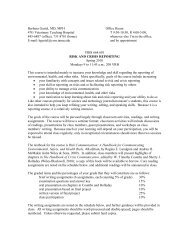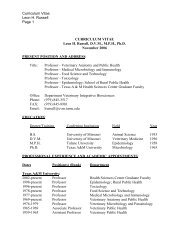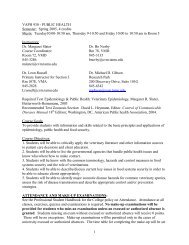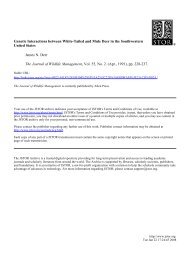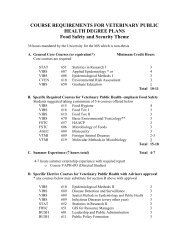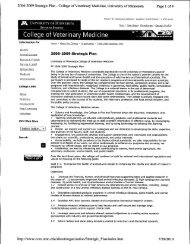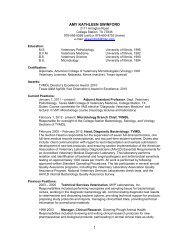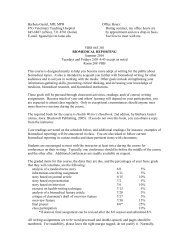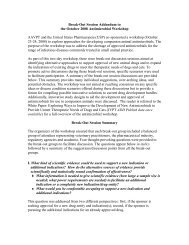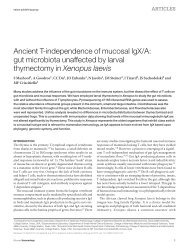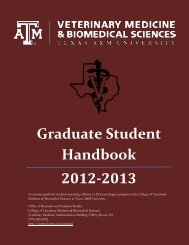From the President - College of Veterinary Medicine
From the President - College of Veterinary Medicine
From the President - College of Veterinary Medicine
Create successful ePaper yourself
Turn your PDF publications into a flip-book with our unique Google optimized e-Paper software.
Volume 23, Number 2 AAVPT Page 6<br />
wide range <strong>of</strong> members <strong>of</strong> <strong>the</strong> veterinary pharmacology<br />
community.<br />
Liaison reports<br />
USP Drug Information: Cory Langston<br />
In June <strong>of</strong> 2004 <strong>the</strong> USP <strong>Veterinary</strong> <strong>Medicine</strong> Drug<br />
Information Expert Committee published a supplement<br />
to JVPT specific to veterinary anti-inflammatory use.<br />
This follows a similar series on veterinary antimicrobials<br />
published last fall. All monographs are available for<br />
public use at www.usp.org (follow veterinary links).<br />
ACVCP: Terry Clark<br />
The American <strong>College</strong> <strong>of</strong> <strong>Veterinary</strong> Clinical<br />
Pharmacology certified seven diplomates following <strong>the</strong><br />
certification examination held in Minneapolis,<br />
Minnesota on June 7-8, 2004.<br />
The new diplomates are Dr. Lara Maxwell, Stillwater,<br />
Oklahoma; . Dr. Butch Kukanich, Garner, North<br />
Carolina; Dr. Sarah Wagner, Fargo, North Dakota; Dr.<br />
Virginia Fajt, Pueblo, CO; Dr. Ron Johnson, Kalamazoo,<br />
MI; Dr. Eden Bermingham, Georgetown, Delaware; and<br />
Dr. Gary Magdesian, Vacaville, California.<br />
AVMA – Council on Biologics and<br />
Therapeutics (COBTA): Dawn Boo<strong>the</strong><br />
Much <strong>of</strong> <strong>the</strong> activities <strong>of</strong> COBTA this year focused on<br />
issues related to prescribing and dispensing drugs. Major<br />
activities included:<br />
1. Discussion <strong>of</strong> providing to <strong>the</strong> AVMA<br />
recommendations regarding internet / compounding<br />
pharmacy sponsorship <strong>of</strong> <strong>the</strong> AVMA convention (in<br />
light <strong>of</strong> potential illegal activities that might be followed<br />
by <strong>the</strong> pharmacies)<br />
2. Generation <strong>of</strong> a “Principles <strong>of</strong> <strong>the</strong> Prescribing<br />
and Dispensing <strong>of</strong> Drugs in <strong>Veterinary</strong> Patients” ; <strong>the</strong><br />
portion <strong>of</strong> this document that focuses on compounding is<br />
being modified with <strong>the</strong> intent <strong>of</strong> being published in <strong>the</strong><br />
JAVMA.<br />
3. Discussion (ongoing) <strong>of</strong> <strong>the</strong> impact <strong>of</strong> <strong>the</strong> new<br />
compliance policy guide for compounding <strong>of</strong> animal<br />
drugs on <strong>the</strong> pr<strong>of</strong>ession, particularly as it pertains to<br />
compounding from bulk substances. The Council is in<br />
dialogue with <strong>the</strong> International Academy <strong>of</strong><br />
Compounding Pharmacies and with <strong>the</strong> Food and Drug<br />
Administration (CVM) regarding mechanisms through<br />
which <strong>the</strong> CPG might be changed such that flexibility is<br />
provided for compounding from bulk substances for<br />
non-food animals when medically necessary while not<br />
compromising <strong>the</strong> FDA’s ability to regulate<br />
inappropriate compounding, including compounding<br />
from bulk substances <strong>of</strong> drugs intended for use in Food<br />
Animals. COBTA does not support <strong>the</strong> repeal <strong>of</strong> <strong>the</strong> new<br />
CPG but supports modification to be pursued.<br />
Discussion also has focused on changes in (expansion <strong>of</strong><br />
) Appendix A or <strong>the</strong> generation <strong>of</strong> a “negative” [do not<br />
compound from bulk substances] list <strong>of</strong> drugs.<br />
4. Discussion (ongoing) with JAVMA regarding<br />
publication policy as it relates to acceptance versus<br />
rejection <strong>of</strong> reports whose methods involve <strong>the</strong> practice<br />
<strong>of</strong> activity perceived to be “illegal” (i.e., formulation <strong>of</strong><br />
a transdermal gel using a bulk substance).<br />
5. Discussion, in conjunction with <strong>the</strong> National<br />
Association <strong>of</strong> State Pharmacy Boards <strong>of</strong> a Verification<br />
<strong>of</strong> Internet Pharmacies Program (VIPPS); and with <strong>the</strong><br />
American <strong>College</strong> <strong>of</strong> <strong>Veterinary</strong> Clinical Pharmacy<br />
regarding a certification program (based on coursework,<br />
experience and examination) for pharmacists that have<br />
demonstrable expertise in veterinary pharmacy.<br />
6. Continued examination <strong>of</strong> mechanisms whereby<br />
reporting <strong>of</strong> adverse events to all medicinal agents might<br />
be improved in veterinary medicine. The most recent<br />
focus has been more in depth dialogue with <strong>the</strong><br />
ASPCA’s Animal Poison Control Center in an attempt<br />
to identify means whereby <strong>the</strong> activities <strong>of</strong> <strong>the</strong> APC<br />
might be expanded to address <strong>the</strong> needs <strong>of</strong> <strong>the</strong> pr<strong>of</strong>ession<br />
regarding reporting <strong>of</strong> adverse events.<br />
Cory Langston joined <strong>the</strong> COBTA as <strong>the</strong><br />
Clinical Pharmacology representative.



